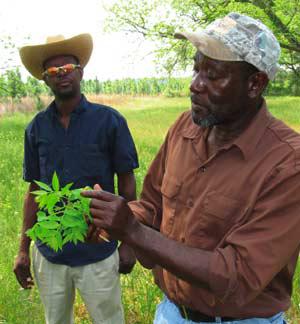Bringing Fair Trade Home

Domestic or international? One of my most lasting memories from my visit with the Federation of Southern Cooperatives in Georgia last summer was a profound sense of commonality.
When I embarked on developing a Domestic Fair Trade program at Equal Exchange, some people questioned whether small farmers in our own country really experience the same struggles as coffee growers in the developing world. While I knew intellectually that rural communities around the world are being devastated by globalization in similar ways, I wasn’t prepared for the degree to which this was confirmed during my visit with Federation of Southern Cooperatives.
As I talked with farmers and we walked in their fields, I had to wonder: Was this Georgia? Or could it be Nicaragua, Tanzania, or Mexico? Around the world, the obstacles faced by small farmers are very similar, as is their pride in their land and the importance of cooperation in helping them to stay on their farms.
Back in 1986, Equal Exchange set out to change the way we think about food and trade. Our basic goal was to link consumers with small coffee farmers in the developing world through Fair Trade. Among our first partners in this concept were food co-ops across the country that shared our mission of building a more just, sustainable and democratic economy. Together, we laid the foundation for what Fair Trade has become in the U.S. and what it can be in the future.
Twenty years later, Fair Trade has entered the mainstream. While it wasn’t so long ago that the coffee industry dismissed our vision of more equitable relationships with farmers as unrealistic, today there are some 400 companies purchasing at least a small portion of their coffee under Fair Trade terms. Now we also see fairly traded chocolate, tea and bananas, and the idea has expanded from the shelves of food co-ops and fair trade shops to the aisles of mainstream grocery stores. Meanwhile, Equal Exchange has grown into a thriving model of cooperative Fair Trade that has exceeded our founders’ original vision. And the food co-ops that pioneered Fair Trade retailing in the U.S. continue to be leaders in the movement for trade justice, economic democracy and sustainability.
Globalization—and suicide
At the same time, the obstacles faced by family farmers around the world have only become more severe. For example, recent press reports have drawn attention to the devastating psychological and social impact of globalization on rural communities in India, where suicide by farmers has become a national crisis. Rarely mentioned is the fact that in many countries in the “developed” world, including the U.S. and Canada, suicide is the leading cause of death among farmers.
While such statistics may seem sensationalist, what they should tell us is that something is very wrong with how we grow, process, market, and distribute food on a local, regional, and global level. As control of agriculture has become more concentrated among an ever-shrinking list of large corporations, farmers around the globe are caught between declining prices for their products, the consolidation of processing, markets, and distribution, and tightening control over inputs such as seed. Today, just 10 corporations account for over 50 percent of the revenue generated globally by food retailing. Not surprisingly, as agribusiness profits have gone up, the share of the consumer dollar received by farming families has declined dramatically. By 2003, there were just 1.9 million working farmers in the U.S.—less than the prison population.
For African American farmers, the challenge is even more severe. For example, in 1920, one in seven farmers were African American; by 1998, just one in 100—a loss rate more than three times that of white farmers. Like many of the small farmers that Equal Exchange works with across Latin America, Africa and Asia, black farmers in the U.S. have been shut out of markets, denied access to capital, and given racist treatment at an institutional level.
That many black farmers remain on their land is a credit to their own perseverance and to their commitment to cooperative action. This is where the Federation of Southern Cooperatives comes in. Founded in 1967, the Federation is dedicated to saving and enhancing the land resources owned by its family farmers of all races and ethnicities, and includes farmer co-ops, credit unions, and community organizations across the Southeast.
Recently Equal Exchange and the Federation began exploring a new idea: Domestic Fair Trade. The goal of the partnership is to bring the Federation’s nearly 40 years of organizing for civil rights and community development together with Equal Exchange’s 20 years of international Fair Trade experience and commitment to cooperation. The result will be healthy snacks grown, processed, marketed, and sold by cooperatives.
Our first project is with Southern Alternatives, a pecan processing cooperative in southern Georgia. Through collective action and persistence, this group has managed to accomplish something inspiring: a black-owned, cooperatively organized pecan processing facility that includes farmers and workers. With the support of the Federation, workers in the facility kept the business alive as a strategy for preserving jobs in a rural area devastated by the modern agricultural economy and abandoned by the textile mills that have moved overseas. What they need now is a trading partner that shares their goals and is committed to fairness and building long-term trade partnerships.
As this article goes to press, the members of Southern Alternatives Co-op are harvesting, cleaning and shelling the pecan harvest. Shortly, Equal Exchange will be roasting, packing and marketing these pecans along with other products from small farmer co-ops here in the US and around the world. Community food co-ops will help us close the circle by offering these products to their customers. If your co-op would like to be part of taking cooperative Fair Trade to the next level, please contact Erbin Crowell at Equal Exchange ([email protected]) or visit www.equalexchange.coop/dft.







